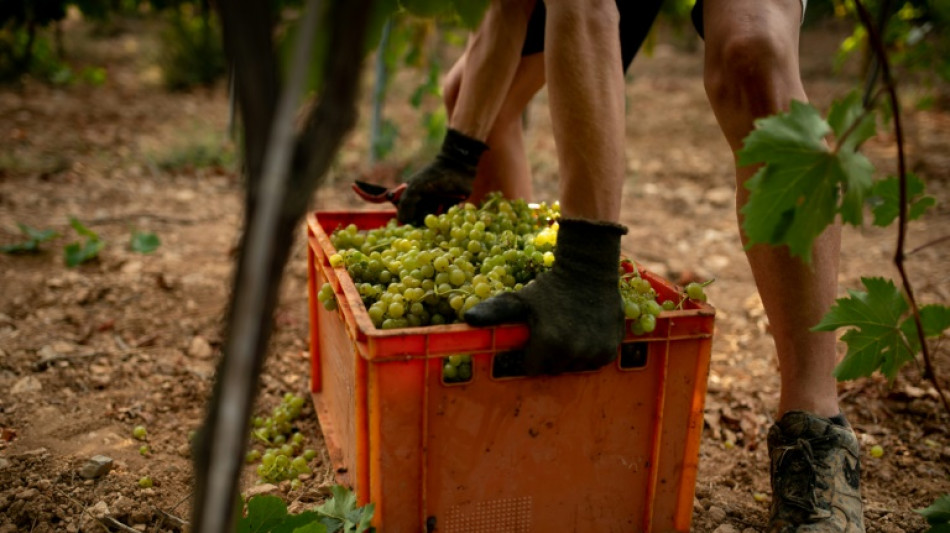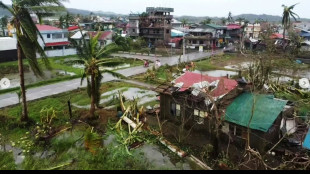
-
 Dutch plan 'nice adios' for Nadal at Davis Cup retirement party
Dutch plan 'nice adios' for Nadal at Davis Cup retirement party
-
Trump meets PGA boss and Saudi PIF head amid deal talks: report

-
 UN chief urges G20 'leadership' on stalled climate talks
UN chief urges G20 'leadership' on stalled climate talks
-
Steelers edge Ravens, Lions maul Jaguars

-
 No.1 Korda wins LPGA Annika for seventh title of the season
No.1 Korda wins LPGA Annika for seventh title of the season
-
Biden touts climate legacy in landmark Amazon visit

-
 England secure Nations League promotion, France beat Italy
England secure Nations League promotion, France beat Italy
-
Star power fails to perk up France's premiere wine auction

-
 Rabiot brace fires France past Italy and top of Nations League group
Rabiot brace fires France past Italy and top of Nations League group
-
Carsley relieved to sign off with Nations League promotion for England

-
 Sinner says room to improve in 2025 after home ATP Finals triumph
Sinner says room to improve in 2025 after home ATP Finals triumph
-
Senegal counts votes as new leaders eye parliamentary win

-
 Lebanon says second Israeli strike on central Beirut kills two
Lebanon says second Israeli strike on central Beirut kills two
-
Puerto Rico's Campos wins first PGA title at Bermuda

-
 Harwood-Bellis risks wedding wrath from Keane after England goal
Harwood-Bellis risks wedding wrath from Keane after England goal
-
'Nobody can reverse' US progress on clean energy: Biden

-
 NBA issues fines to Hornets guard Ball, T-Wolves guard Anthony
NBA issues fines to Hornets guard Ball, T-Wolves guard Anthony
-
Biden allows Ukraine to strike Russia with long-range missiles: US official

-
 Britain dump out holders Canada to reach BJK Cup semi-finals
Britain dump out holders Canada to reach BJK Cup semi-finals
-
Biden clears Ukraine for missile strikes inside Russia

-
 Ukrainians brave arduous journeys to Russian-occupied homeland
Ukrainians brave arduous journeys to Russian-occupied homeland
-
Australia not focusing on Grand Slam sweep after thrashing Wales

-
 Wales's rugby woes -- three talking points
Wales's rugby woes -- three talking points
-
Jannik Sinner, the atypical Italian star on top of the tennis world

-
 'Devil is in the details,' EU chief says of S.America trade deal
'Devil is in the details,' EU chief says of S.America trade deal
-
Kusal Mendis defies injury as Sri Lanka beat New Zealand to clinch ODI series

-
 Gatland would back change after Australia condemn Wales to record defeat
Gatland would back change after Australia condemn Wales to record defeat
-
England secure Nations League promotion, Haaland inspires Norway

-
 Sinner sweeps past Fritz to win ATP Finals
Sinner sweeps past Fritz to win ATP Finals
-
Mahrez scores as five-goal Algeria crush Liberia

-
 Toll in Tanzania building collapse rises to 13, survivors trapped
Toll in Tanzania building collapse rises to 13, survivors trapped
-
'Red One' tops N.America box office but could end up in the red

-
 NATO's largest artillery exercise underway in Finland
NATO's largest artillery exercise underway in Finland
-
Australia condemn Wales to record 11th successive loss in 52-20 rout

-
 Russian opposition marches against Putin in Berlin
Russian opposition marches against Putin in Berlin
-
Dozens killed, missing in Israeli strike on devastated north Gaza

-
 Macron defends French farmers in talks with Argentina's Milei
Macron defends French farmers in talks with Argentina's Milei
-
England players to blame for losing streak says captain George

-
 'Emotional' Martin defies Bagnaia to claim first MotoGP world championship
'Emotional' Martin defies Bagnaia to claim first MotoGP world championship
-
Slovakia beat Australia to reach BJK Cup semi-finals

-
 Sluggish Italy fight to narrow win over Georgia
Sluggish Italy fight to narrow win over Georgia
-
India and Nigeria renew ties as Modi visits

-
 Grit and talent, a promise and a dilemma: three things about Jorge Martin
Grit and talent, a promise and a dilemma: three things about Jorge Martin
-
Martin denies Bagnaia to win first MotoGP world championship

-
 Typhoon Man-yi weakens as it crosses Philippines' main island
Typhoon Man-yi weakens as it crosses Philippines' main island
-
Noel wins season-opening slalom in Levi as Hirscher struggles

-
 Tough questions for England as Springboks make it five defeats in a row
Tough questions for England as Springboks make it five defeats in a row
-
Russia pounds Ukraine with 'massive' attack in 'hellish' night

-
 McIlroy clinches Race to Dubai title with DP World Tour Championship win
McIlroy clinches Race to Dubai title with DP World Tour Championship win
-
Glastonbury 2025 tickets sell out in 35 minutes


Spain, Portugal dryness 'unprecedented' in 1,200 years
Parts of Portugal and Spain are the driest they have been in a thousand years due to an atmospheric high-pressure system driven by climate change, according to research published Monday, warning of severe implications for wine and olive production.
The Azores High, an area of high pressure that rotates clockwise over parts of the North Atlantic, has a major effect on weather and long-term climate trends in western Europe.
But in a new modelling study published in the journal Nature Geoscience, researchers in the United States found this high-pressure system "has changed dramatically in the past century and that these changes in North Atlantic climate are unprecedented within the past millennium".
Using climate model simulations over the last 1,200 years, the study found that this high-pressure system started to grow to cover a greater area around 200 years ago, as human greenhouse gas pollution began to increase.
It expanded even more dramatically in the 20th century in step with global warming.
The authors then looked at evidence of rainfall levels preserved over hundreds of years in Portuguese stalagmites, and found that as the Azores High has expanded, the winters in the western Mediterranean have become drier.
The study cites projections that the level of precipitation could fall a further 10 to 20 percent by the end of this century, which the authors say would make Iberian agriculture "some of the most vulnerable in Europe".
They warn that the Azores High will continue to expand during the 21st century as greenhouse gas levels rise, leading to an increasing risk of drought on the Iberian Peninsula and threatening key crops.
"Our findings have important implications for projected changes in western Mediterranean hydroclimate throughout the twenty-first century," the authors said.
- Wither vines -
The Azores High acts as a "gatekeeper" for rainfall into Europe, according to the study, with dry air descending in the summer months to cause hot, arid conditions in much of Portugal, Spain and the western Mediterranean.
In the cool, wetter winter period, the high-pressure system swells, sending westerly winds carrying rain inland.
This winter rain is "vital" for both the ecological and economic health of the region, but it has been decreasing, particularly over the second half of the 20th century.
While previous research had not untangled the effects of natural variability on the Azores High, the authors said their findings show its expansion during the industrial era is linked to the rise of atmospheric greenhouse gas concentrations.
A study cited in the latest research estimates that the area suitable for grape growing in the Iberian Peninsula could shrink by at least a quarter and potentially vanish almost completely by 2050 because of severe water shortages.
Meanwhile, researchers have predicted a 30-percent drop in production for olive regions in southern Spain by 2100.
Winemakers are already looking for ways to adapt to the changing climate, such as moving vineyards to higher altitudes and experimenting with more heat-tolerant varieties.
Last year, scientists found that a severe spring frost that ravaged grape vines in France was made more likely by climate change, with the plants budding earlier and therefore more susceptible to damage.
P.Serra--PC
